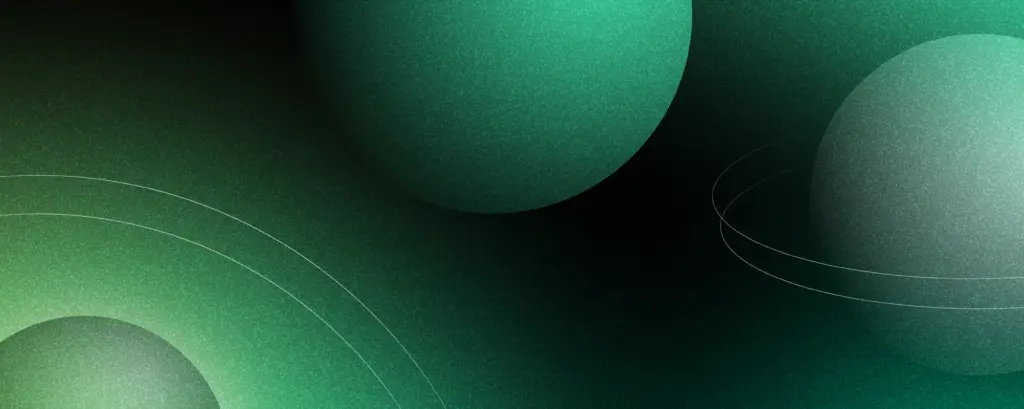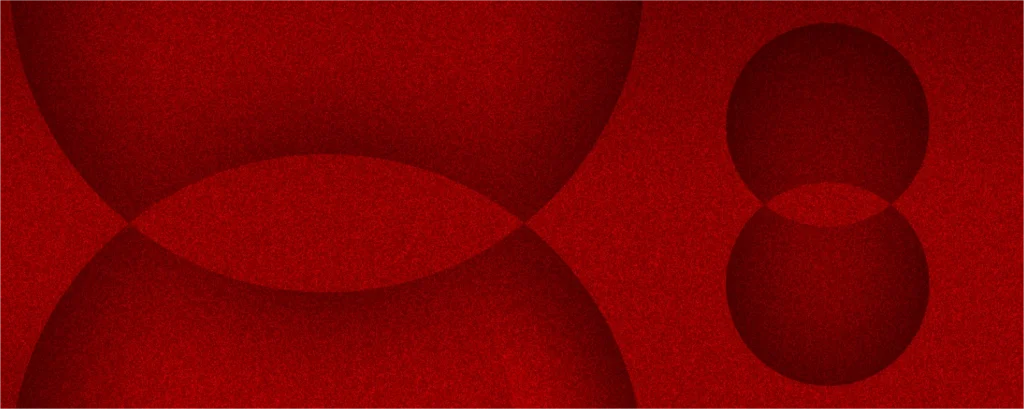October 28th, 2021 | by CSHARK
Product Discovery Workshop: A Head Start to MVP Development

Table of contents
Creating a new digital product is exciting and energizing. Entrepreneurs often rush straight into development, thinking about launching quickly, convinced that their tool will disrupt the market. However, by skipping the initial product discovery phase, they embark on a journey that may fail. The initial product discovery workshop is critical for developing the product vision, objectives, and business goals of any new solution. It helps to launch a successful product that meets the market needs. However, the quality of the product discovery workshop also impacts the results and subsequent steps. They must be oriented at pinpointing the value that the final product will deliver and overcoming potential risks and challenges.
Let us explain the discovery workshop process and list the key questions founders should address to approach product discovery the right way. More specifically, we’ll focus on:
- the concept of a discovery workshop and why you shouldn’t skip it,
- the benefits of a discovery workshop,
- when you should hold a discovery workshop and when it won’t be necessary,
- how to run a successful and goal-oriented discovery workshop.
What is a product discovery workshop and why shouldn’t you skip it?
A discovery workshop is a very first stage in Minimum Viable Product (MVP) development that helps turn abstract ideas into tangible, presentation-ready prototypes.
During the workshop, all stakeholders, i.e. the founder and other relevant decision-makers (such as marketing, growth, and business development specialists), sit down with the outsourced product development team to discuss and establish a common vision of the digital product and define the scope of the project. This involves planning the development phase, establishing a smart business model, and identifying the potential product-market fit. A successful discovery workshop yields specific answers to the following questions:
- What user problem will the product solve?
- Who are the customers and how will the product make their lives easier?
- What’s the product’s Unique Value Proposition (UVP)?
- How do we define the success of the product?
- What specific functionalities will help solve the diagnosed problems? What does the target audience require from the product?
- What are the core functionalities required for a good start?
- What is the action plan for the design & development process and project delivery?
- What roles should be assigned to every team member and stakeholder?
To arrive at the answers, the workshop must involve the facilitator, the designers, developers, and the decision-maker engaged in the process. You may think that you don’t really need to answer these questions before you delve into the development phase.
The risks of skipping the product discovery phase:
- Underestimating implementation costs
- Lack of product-market fit
- Team misalignment
You can of course do that, but you should bear in mind the risks of skipping the product discovery phase:
Underestimating implementation costs
Your product idea may be simple, but it doesn’t imply that turning it into reality will be straightforward as well. Without confronting the initial idea with technical experts and other stakeholders, you will likely remain unaware of certain indispensable project elements that may affect the final budget. Choosing the wrong technology stack or skipping certain steps in the process usually leads to costly changes or corrections. In the worst-case scenario, you will run out of money halfway through and won’t be able to finalize your project. The experience of experts who have created and released several products to the market successfully can be a great asset to anyone who is just starting their product development journey.
According to CBInsights, 38% of startups fail because they run out of funds before completing the project or were unable to raise more capital – that’s also the most common reason why new businesses fail. By conducting a product discovery workshop at the outset, you bring all the stakeholders to the table to discuss the budget, which brings you much closer to the right estimate at the end.
Lack of product-market fit
Even if you raise enough capital to create your product, you may not reach the customers. How do you know if your product is what the users truly need? If you don’t validate and test your idea first, you will be building your product based on assumptions. These may prove to be costly if you don’t manage to build a user base that will pay for and continue to use your product.
Founders can look for validation via different mechanisms: a simple landing page that explains what the product is about with an option to sign up for purchase once it’s launched, or a crowdfunding campaign. The cost will be relatively low and the volume of interest will suggest whether you’re going in the right direction or not.
The best way to ensure you are building a product that meets the market needs is to start with a Minimum Viable Product that begins with a discovery workshop. To better understand the process, you can take a look at how we worked with Nudge to create an effective MVP.
Team misalignment
The goal of a discovery workshop is also to get the team together and define the project’s scope. This implies both the experts from the partners and the client’s side: the CEO, the CTO, the product owner, developers, designers, business analysts, and sales professionals will have different perspectives and confronting the team with conflicting points of view will allow choosing the best direction for the product.
If you skip this phase, the individual team members may have different ideas about the product: its goal, features, and vision. This is bound to happen especially when you build a complex tool or a solution to a niche problem. If the team members aren’t on the same page from the very beginning, you will lose time on handling miscommunication, and the issues and errors that will occur as a result.
The benefits of product discovery workshops
Your new idea is certainly great, but if you don’t give enough thought to the entire implementation process, you may lose the market value. The discovery phase clarifies that process, no matter how simple or complex your idea may be.
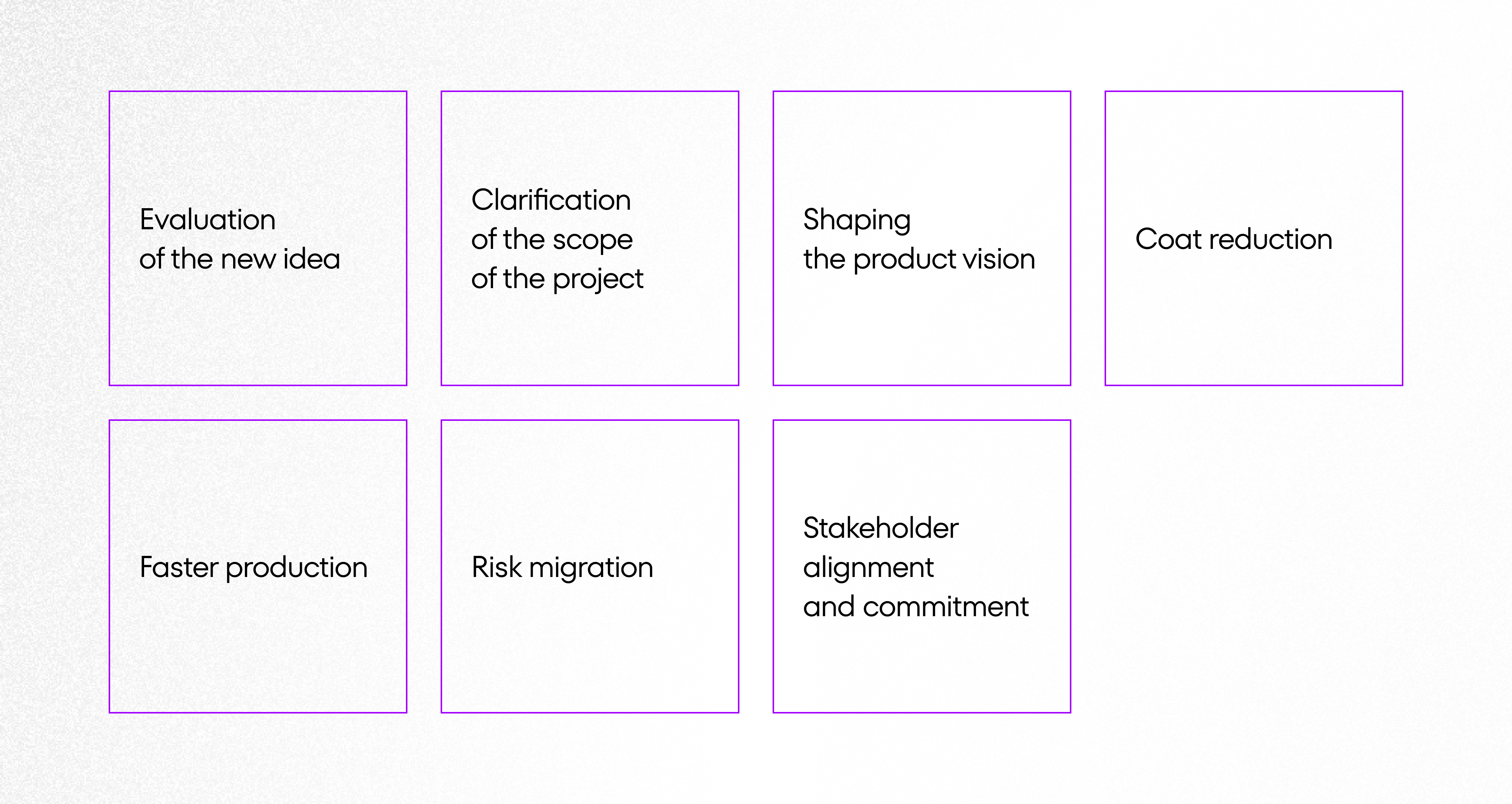
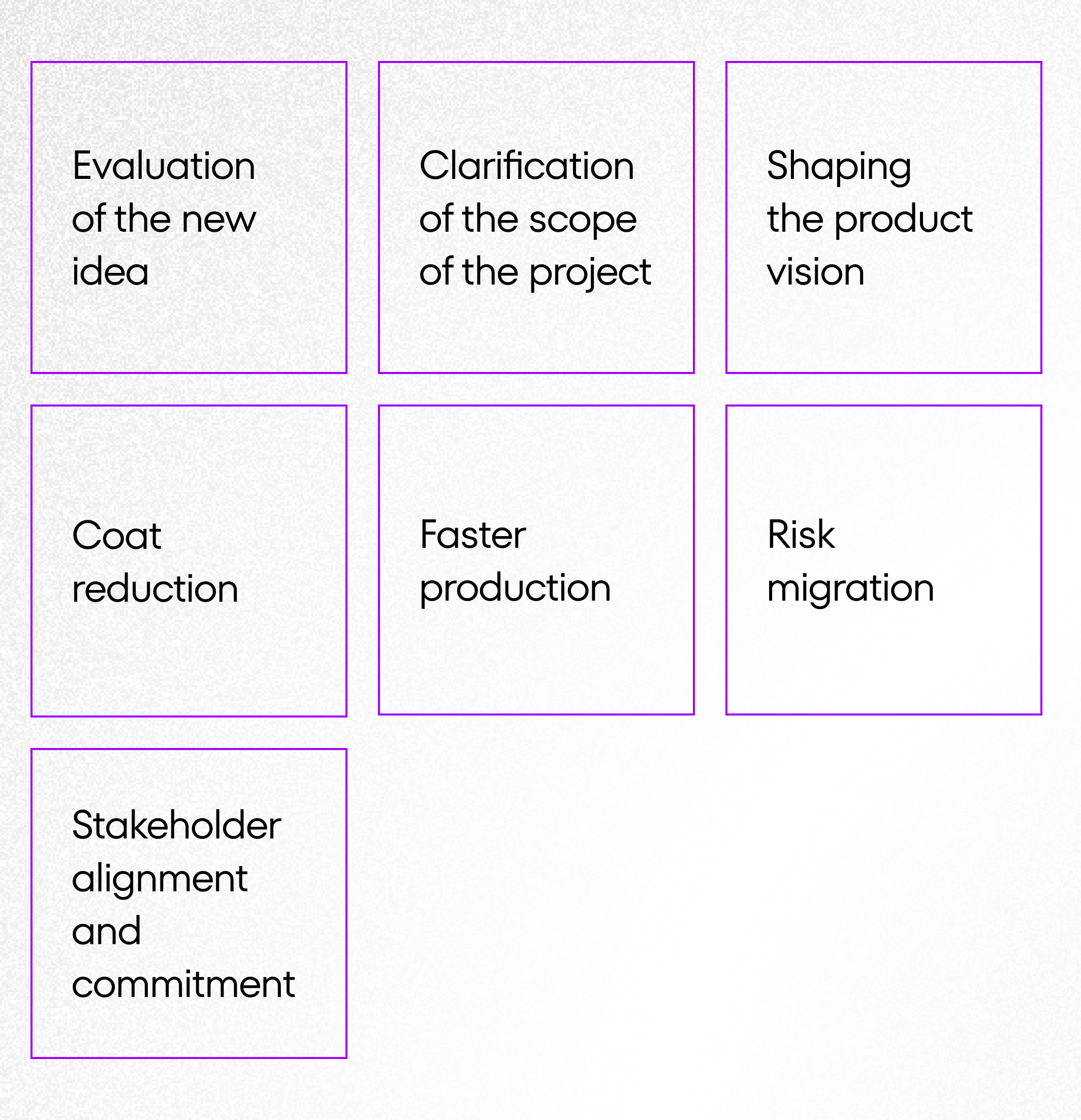
Here are the benefits you’ll get from the discovery workshop:
Evaluation of the new idea
Discovery workshops usually begin with thorough research, oriented at checking whether your idea is actually grounded in reality and has the potential to solve real problems and if it’s likely to establish a solid user base. If you skip this phase, you may end up investing in a solution that will work and look great, but no one will want to use it.
Often, founders don’t see the added value of running the workshop. However, once they confront their idea with experienced experts from different domains, they realize the idea may require adjustment. With that, they end up with solutions that are better thought out and more relevant.
Clarification of the scope of the project
The product discovery workshops provide space for clarifying the full scope of the project: the objectives, requirements, and expected outcomes. They are about finding the right balance and setting the minimum requirements so that the product idea can be validated quickly. At the same time, the team should ensure enough room for future scaling up.
It’s the time for the project team and all stakeholders to engage and ask the questions relevant to their expertise and reach clarity on the specificities of the tool. This communication phase helps to ensure that everyone is on the same page and once the implementation phase begins these expected outcomes are clear and everyone knows what to do and where to go.
Shaping the product vision
As the project team sits down to clarify the requirements and functional specifications, they also establish a common vision of the final product. The discovery workshop should include a discussion on the features, UX and UI, and branding. Team members should also pinpoint the most effective solutions from the business and user perspective.
The key objective is to focus on the users and their problems, so understanding the target group is indispensable to launching a successful product, especially if it’s meant to serve a specific market segment. Collecting insights and running surveys may be extremely helpful here at the ideation stage and for future marketing endeavors.
Cost reduction
Numerous factors affect the overall cost. Implementation of specific features and functionalities tends to affect the totals the most — especially when you suddenly decide to implement additional features. A product discovery workshop helps to avoid investing resources into those functionalities that founders or investors require, but won’t be truly useful from the user’s perspective.
During the product discovery workshop, the project team identifies the key features required to achieve specific business goals. The workshop also helps to prioritize the features or elements of the product that are indispensable for the MVP launch and later stages of the product development lifecycle. Once you arrive at the development plan, you can eliminate any unnecessary expenses.
Faster production
During the discovery workshop, Identifying and prioritizing features lets the production team prepare an action plan and assign roles for every team member. Product managers will typically draw attention to user stories that inform designers and programmers about user needs and how specific actions will help them achieve it.
With this, the production team can establish a detailed timeline that leaves no room for idleness. That plan saves weeks of development time by eliminating the time you would otherwise waste on pondering the next steps.
Risk mitigation
Product discovery workshops bring together experts from different domains: designers, programmers, product managers, marketers, and others. Once they get together, they identify potential risks and challenges related to the product, the business, or the market. This discussion allows the team to prepare for those challenges and minimize the ultimate failure.
Stakeholder alignment and commitment
Aligning stakeholders involved in the entire process is crucial to deliver a successful product. A discovery workshop provides space to answer all the questions that the stakeholders may have with regard to the final solution. Doing this at the outset of the development process helps ensure everyone understands the objectives and commits to achieving them — it’s the only way to eliminate disruptions in the implementation process.
When should you hold a discovery workshop?
The best answer to this question is: it depends. Product discovery is about identifying potential issues that may arise while creating a new digital product.
These problems may stem out of the nature of the product, the target market or user segment, the business model, and other, unforeseen circumstances. That’s why, in our opinion, it’s always best to host some kind of a discovery workshop — whether it’s a full-fledged workshop or just a quick, simplified version of it. Here’s when you should definitely consider running a thorough discovery workshop:
When you’re building a complex product
The more complex your product, the more challenges, and issues may arise as the project progresses. A discovery workshop will certainly help to simplify your idea— it’s in fact necessary to ensure team alignment.
When you don’t have access to expert advice
When you’re working in a relatively small team, especially without programmers on board, commissioning a discovery workshop externally will give you a significant advantage. It’s the partner’s responsibility to select the necessary and relevant specialists for every project.
The plus side of working with an external partner is that they bring together experts from different fields, helping you form a cross-functional team that will prepare you for critical issues and how to handle them. When choosing an external partner, ask about their experience in hosting these workshops and the expertise they can bring to the table.
When time is your money
In product development, taking a step back will often allow you to sprint later. Stepping back is about checking whether we’re about to go in the right direction.
In a circumstance when you are pressed by the need to launch soon or secure funding fast, a two-week discovery workshop may seem like a large investment in terms of time. However, what you gain as a result is an investment-ready prototype and a ready-to-use plan of action for further development. These will guide you through the process seamlessly and ensure you won’t waste time thinking: “so, what’s next?”.
When you’re about to scale up
Every product must evolve as the market conditions shift. It’s important that it matures with the users and responds to their changing needs. When you’re about to scale up, the journey will be marred with yet different challenges and you may be required to pivot. A discovery workshop would help you find the right direction in that case.
While it’s better to outsource such a workshop to an experienced external partner when creating an MVP, once you have a working product, you may think about conducting a discovery workshop internally. We describe the process below.
When can you skip a discovery workshop?
Since a product discovery workshop helps to confirm the validity of the initial idea and set the direction for the development, we don’t advise skipping it. There are, however, three cases in which holding the workshop may not be necessary:
- You’re working on a small product with just a few standard functionalities. Perhaps it’s something that it’s required inside your organization, you already know what the objective of the solution is and understand what functionalities are required to meet this objective.
- You already have what’s required to start: thorough documentation and a confirmation of the validity of your idea.
- Instead of building a new solution from scratch, you’re about to make small improvements to an already-existing product. As long as that product is working well, you can skip the discovery phase.
The discovery workshop process
A product discovery workshop is an organized process that turns the abstract idea into a tangible prototype. In our practice, we follow the Design Sprint 2.0 principles adapted slightly to our needs to allow us to work with our customers more effectively. We focus on asking the most important questions first, so there are no loose ends as the project unfolds.
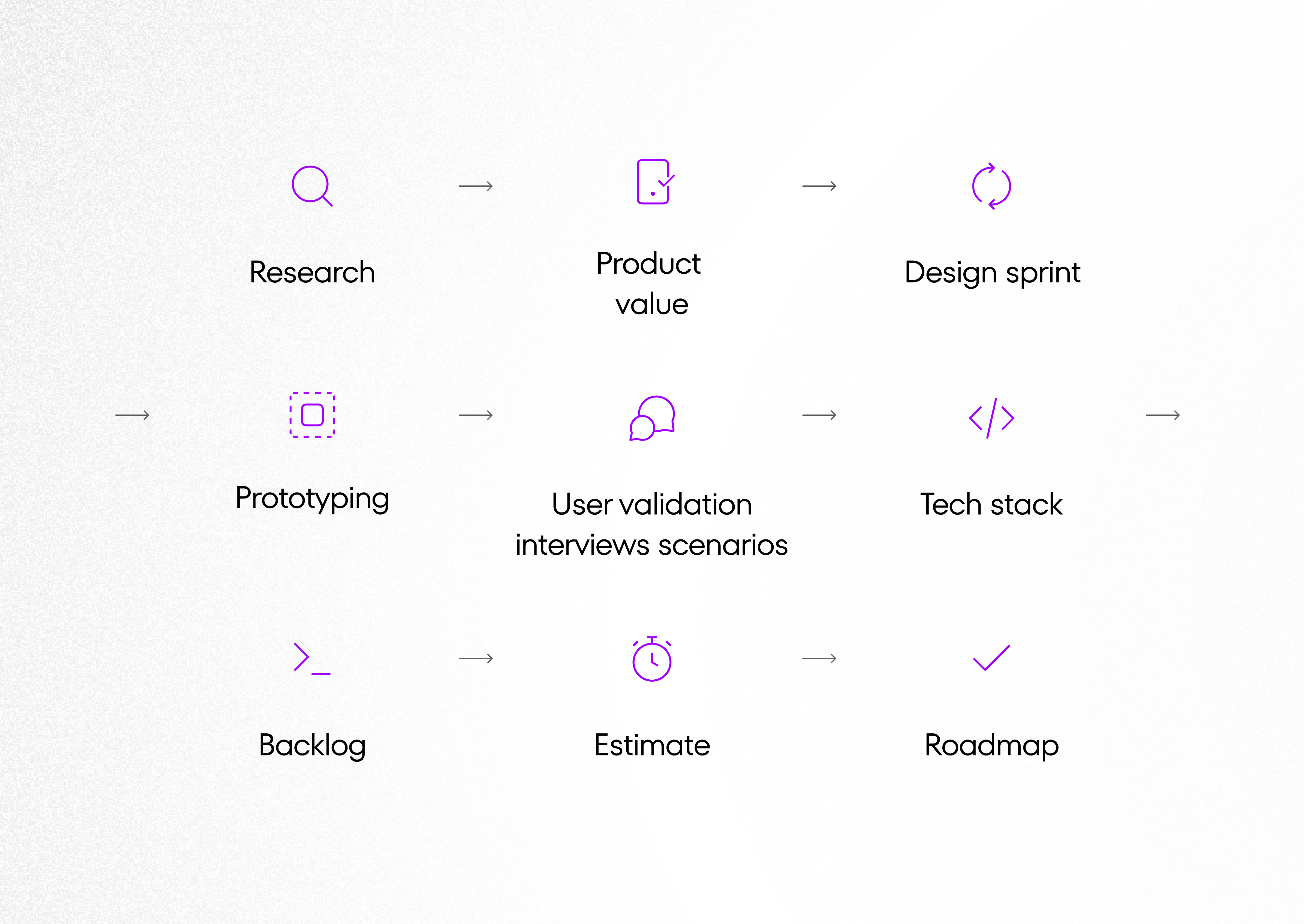
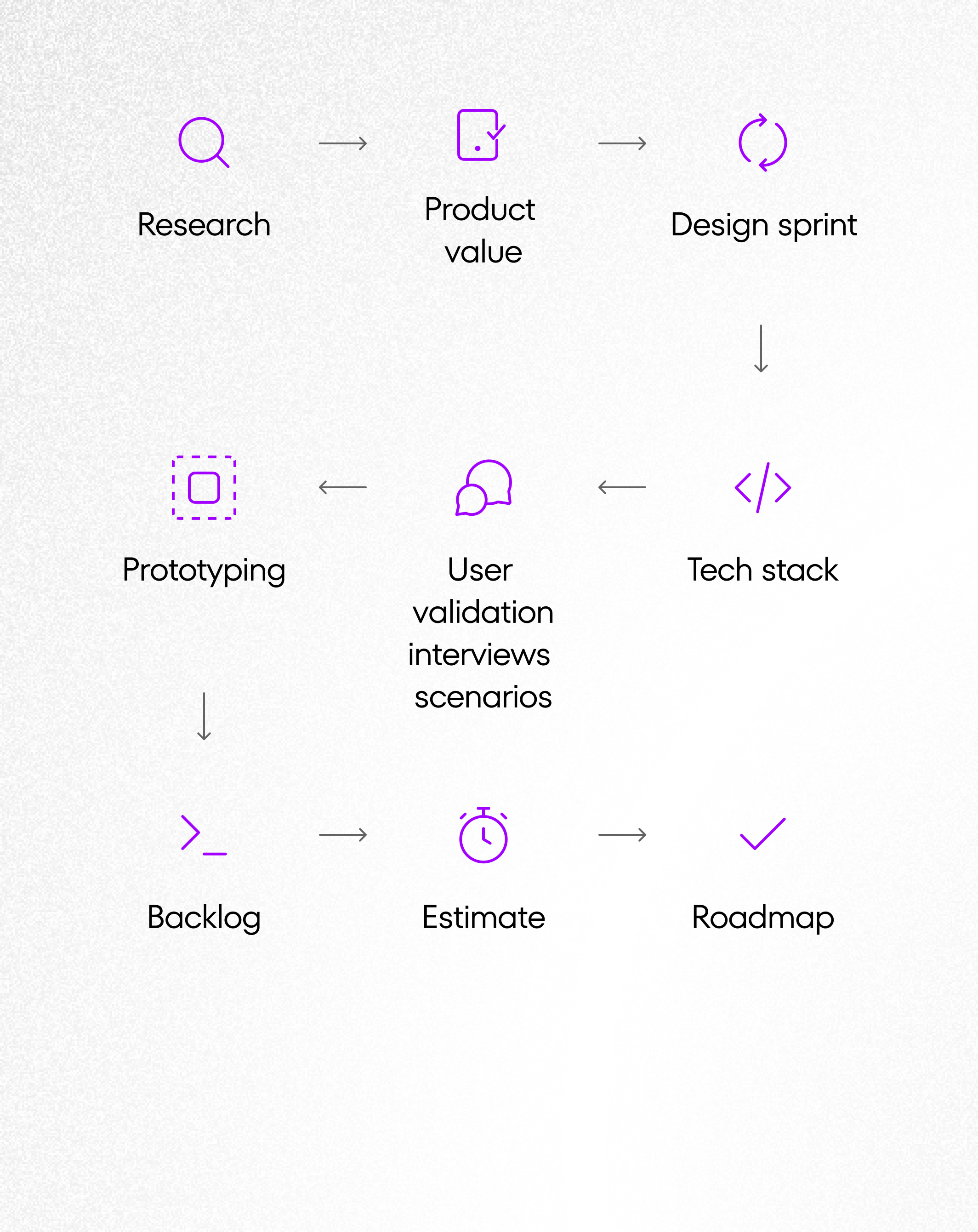
Here’s what’s involved in a typical product discovery workshop agenda (bear in mind though that we always tailor the process to our client’s needs).
1. Research
A product discovery workshop includes thorough research that tests the main assumption. We ask multiple questions to define the specific problem we are about to solve and understand the target group and potential competitors. As a result of this process, we define user personas and their specific needs and identify the features that can solve their problems.
2. Product value
This stage focuses on finding the answers to the previously diagnosed needs. This strategy-oriented workshop focuses on facilitating a product marketing discussion and establishing a distinctive brand DNA as well as a unique value proposition that resonates with that brand. To this end, we deliver thorough documentation that describes the user-centered Value Proposition and includes the branding essentials.
3. Design sprint 2.0
The sprint is about combining the previous learnings and translating them into accurate and creative design solutions. This part of the workshop will again consider the user personas to identify the best user journey. We use the founder’s knowledge and combine it with our team of experts to double the forces. The results include a map of the product or process, a set of benchmarks, and rough sketches of the product.
4. Prototyping
After the design sprint, we prepare a visual prototype that presents the key product assumptions (it’s something between lo-fi mockups and actual product screens). This interactive prototype can then be used to solicit funding.
5. User validation interview scenarios
With the visual prototype at hand, you’ll be ready to test the assumptions with potential users. We’ll help you with this process by preparing a user validation interview scenario that you can use to gather the first round of feedback and understand the potential for product-market fit.
6. Tech stack
Once the initial validation is complete, we discuss the architecture of your application, focusing on identifying the tech stack that allows building the product efficiently and effortlessly, while meeting the business objectives. We’re always oriented at building future-proof digital products, ready for growth or pivots.
7. Backlog
Next, we prepare the technical documentation of the product we’ve just designed together. We will plan out the user stories and list the key technology assumptions and use them to identify and evaluate potential risks. This stage yields comprehensive documentation that maps out the product as a whole.
8. Estimate
Once we have the initial prototype and the backlog, we can prepare a thorough price estimate that gives you an idea about the total cost of the project as well as its individual functionalities. It will be your number one asset when talking to potential investors. With the estimate, you can also be sure you won’t underestimate the entire project.
9. Roadmap
The roadmap is the final output of the discovery workshop. During the workshop, the team will surely come up with a lot of new, innovative functionalities and ideas. While certainly interesting, they may be costly or of less priority to the users and thus should be moved out of the MVP scope. The roadmap sets a timeline for product development — it’s your plan of action that helps ensure your project is lean and achievable and takes into account all the potential innovations.
Discovery workshop deliverables
The discovery workshop is the key preparatory stage that helps the project team establish the common vision of the project and clarify the objectives and expectations. The value of this workshop is derived from the participation of a multidisciplinary team consisting of experts from CSHARK and from the client’s side. That team is always adapted to the specific needs of our client and the project.
Here are the deliverables that you receive as a result of product discovery workshops carried out with CSHARK:
- An interactive visual prototype — it usually takes about two weeks to build a prototype for initial user testing
- A detailed backlog and roadmap — they take another two weeks to prepare
The deliverables will be an invaluable asset when you talk to potential investors. You’ll receive an initial sketch of the product that will allow you to conduct user testing and gather meaningful feedback to refine it.
If you’d like to know more about new product development, you can take a look at some of our resources on MVP and design.
Begin MVP development with product discovery
Product development is more complex than most founders may think. Having a great idea is indispensable, but the idea alone will not guarantee the success of your product. You cannot simply share your vision with the production team and expect satisfactory results from the development work. You first need to sit down and define what success will look like — that’s precisely what the discovery workshop was designed for.
This workshop helps to build a common understanding of the scope of the project, its objectives, and desired outcomes. These must take into account stakeholder expectations, so their involvement is crucial. By working together with different experts at the outset, founders can gather the existing knowledge from different domains and apply it to minimize project risks and build a product that will meet the needs of the market.

